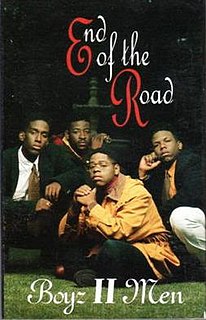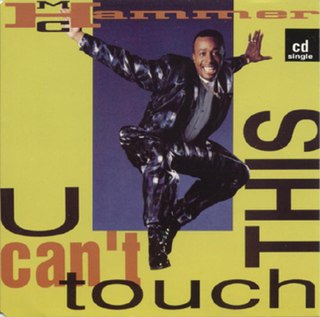
In mathematics, the natural numbers are those numbers used for counting and ordering. Numbers used for counting are called cardinal numbers, and numbers used for ordering are called ordinal numbers. Natural numbers are sometimes used as labels, known as nominal numbers, having none of the properties of numbers in a mathematical sense.
Rhythm and blues, frequently abbreviated as R&B or R'n'B, is a genre of popular music that originated in African-American communities in the 1940s. The term was originally used by record companies to describe recordings marketed predominantly to urban African Americans, at a time when "urbane, rocking, jazz based music ... [with a] heavy, insistent beat" was becoming more popular. In the commercial rhythm and blues music typical of the 1950s through the 1970s, the bands usually consisted of piano, one or two guitars, bass, drums, one or more saxophones, and sometimes background vocalists. R&B lyrical themes often encapsulate the African-American experience of pain and the quest for freedom and joy, as well as triumphs and failures in terms of relationships, economics, and aspirations.

In chemistry, a group is a column of elements in the periodic table of the chemical elements. There are 18 numbered groups in the periodic table; the f-block columns are not numbered. The elements in a group have similar physical or chemical characteristics of the outermost electron shells of their atoms, because most chemical properties are dominated by the orbital location of the outermost electron.

Elgin Baylor Lumpkin, better known by his stage name Ginuwine, is an American R&B singer, songwriter, dancer, and actor. He began his career as a member of Swing Mob in the early 1990s. Signing to Epic Records as a solo artist in the mid-1990s, Ginuwine has released a number of multi-platinum and platinum-selling albums and singles, becoming one of R&B's top artists during the late 1990s and early 2000s. He had significant commercial success with his first four albums: Ginuwine...The Bachelor, 100% Ginuwine, The Life (Platinum), and The Senior (Gold). According to Billboard, Ginuwine has sold roughly 10 million albums in the US. Ginuwine received the Urban Music Icon award at the 2021 Black Music Honors.

Lamont Herbert Dozier was an American singer, songwriter, and record producer from Detroit, Michigan. He co-wrote and produced 14 US Billboard number-one hits and four number ones in the UK.
New jack swing, new jack, or swingbeat is a fusion genre of the rhythms and production techniques of hip hop and dance-pop, and the urban contemporary sound of R&B. Spearheaded by producers Teddy Riley and Bernard Belle, new jack swing was most popular from the late-1980s to early-1990s. Its influence, along with hip hop, seeped into pop culture.

James Edward Ingram was an American singer, songwriter and record producer. He was a two-time Grammy Award-winner and a two-time Academy Award nominee for Best Original Song. After beginning his career in 1973, Ingram charted eight Top 40 hits on the U.S. Billboard Hot 100 chart from the early 1980s until the early 1990s, as well as thirteen top 40 hits on the Hot R&B/Hip-Hop Songs chart. In addition, he charted 20 hits on the Adult Contemporary chart. He had two number-one singles on the Hot 100: the first, a duet with fellow R&B artist Patti Austin, 1982's "Baby, Come to Me" topped the U.S. pop chart in 1983; "I Don't Have the Heart", which became his second number-one in 1990 was his only number-one as a solo artist.

Joseph Lewis Thomas, known mononymously as Joe, is an American R&B singer. Born and raised in Ashburn, Georgia, he later relocated to Atlanta and signed a record deal with Polygram Records in 1992. He rose to prominence after releasing his debut album Everything the following year. He followed it with a series of successful albums under Jive Records, including All That I Am (1997), the international bestseller My Name Is Joe (2000) as well as the multi-certified albums Better Days (2001) and And Then... (2003). Several songs from these albums became hit singles on the pop and R&B record charts, including the number-one hit "Stutter", the top ten entries "All the Things ", "Don't Wanna Be a Player", and "I Wanna Know" as well as his collaborations "Faded Pictures", "Thank God I Found You" and "Still Not a Player".

Tony! Toni! Toné! was an American soul/R&B band from Oakland, California, popular during the late 1980s and early to mid-1990s. During the band's heyday, it was composed of D'wayne Wiggins on lead vocals and guitar, his brother Raphael Saadiq on lead vocals and bass, and their cousin Timothy Christian Riley on drums, keyboards, and background vocals. Additional original founders are Choreographer/Bassist Elijah "EB" Baker, Songwriter/Producer/Keyboardist Antron "Ice Cream" Haile, and Producer/Jazz Guitarist John "Jubu" Smith. Originally, the band went by "Tony, Toni, Toné" as a joke, until they realized it "had a nice ring to it".

I'm Your Baby Tonight is the third studio album of American singer Whitney Houston released on November 6, 1990, by Arista Records. The album has been certified quadruple platinum in the US by the RIAA.

"End of the Road" is a song by American R&B group Boyz II Men for the Boomerang soundtrack. It was released in 1992 and was written by Babyface, Antonio L.A. Reid and Daryl Simmons. "End of the Road" achieved domestic and international success. In the United States, "End of the Road" spent a then record breaking 13 weeks at number one on the US Billboard Hot 100, a record broken later in the year by Whitney Houston's 14-week number one hit "I Will Always Love You"; Boyz II Men would later match Houston's record with "I'll Make Love to You", which spent 14 weeks at number one in 1994, and then reclaim the record with "One Sweet Day", which spent 16 weeks at number one from 1995 to 1996.

"U Can't Touch This" is a song co-written, produced, and performed by American rapper MC Hammer. It was released as the third single from his third album, Please Hammer Don't Hurt 'Em (1990), and has been considered his signature song. Along with Hammer, Rick James shares songwriting credits with Alonzo Miller, as the song samples the prominent opening riff of James' 1981 single "Super Freak". The song has been used and referred to in many television shows, films, commercials, and other forms of media. It has also received multiple awards and recognition.
Stacy Lattisaw Jackson is an American R&B singer from Washington, D.C., United States.
Contemporary R&B is a popular music genre that combines rhythm and blues with elements of pop, soul, funk, hip hop, and electronic music.

"Nothing Compares 2 U" is a song written and composed by Prince for his side project, The Family; the song featured on their eponymous 1985 debut album. The song's lyrics explore feelings of longing from the point of view of an abandoned lover.
Top R&B/Hip-Hop Albums is a music chart published weekly by Billboard magazine that ranks R&B and hip hop albums based on sales in the United States and is compiled by Nielsen SoundScan. The chart debuted as Hot R&B LPs in the issue dated January 30, 1965@ in an effort by the magazine to further expand into the field of rhythm and blues music. It then went through several name changes, being known as Soul LPs in the 1970s and Top Black Albums in the 1980s, before returning to the R&B identification in 1990 and affixing a hip hop designation in 1999 to reflect the latter's growing sales and relationship to R&B during the decade.

"I'll Be Good to You" is a 1976 hit song by R&B duo the Brothers Johnson. George Johnson, one of the two Johnson brothers in the band, wrote the song after deciding to commit to a relationship with one woman, instead of dating several at a time. While George was recording a demo for the song, family friend Senora Sam came by and added some lyrics. Brothers Johnson producer and mentor Quincy Jones heard the song, liked it, and convinced George to sing lead on the finished track. Released from their debut album, Look Out for #1, it was a top-ten hit on the Billboard Hot Singles Charts, peaking at number three, and a number one song on the Billboard R&B Charts during the summer of 1976. The single was later certified gold by the RIAA.

Prince released several hundred songs both under his own name and under pseudonyms and/or pen names, as well as writing songs which have been recorded by other artists. Estimates of the actual number of songs written by Prince range anywhere from 500 to well over 1,000. He has released 97 singles, 34 promotional singles, 21 internet singles, and eight internet downloads.